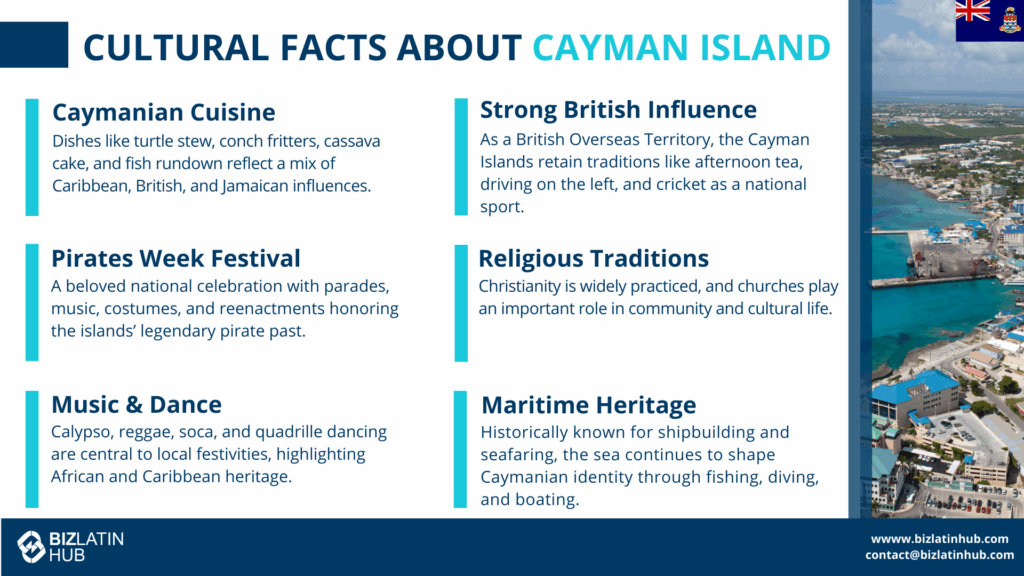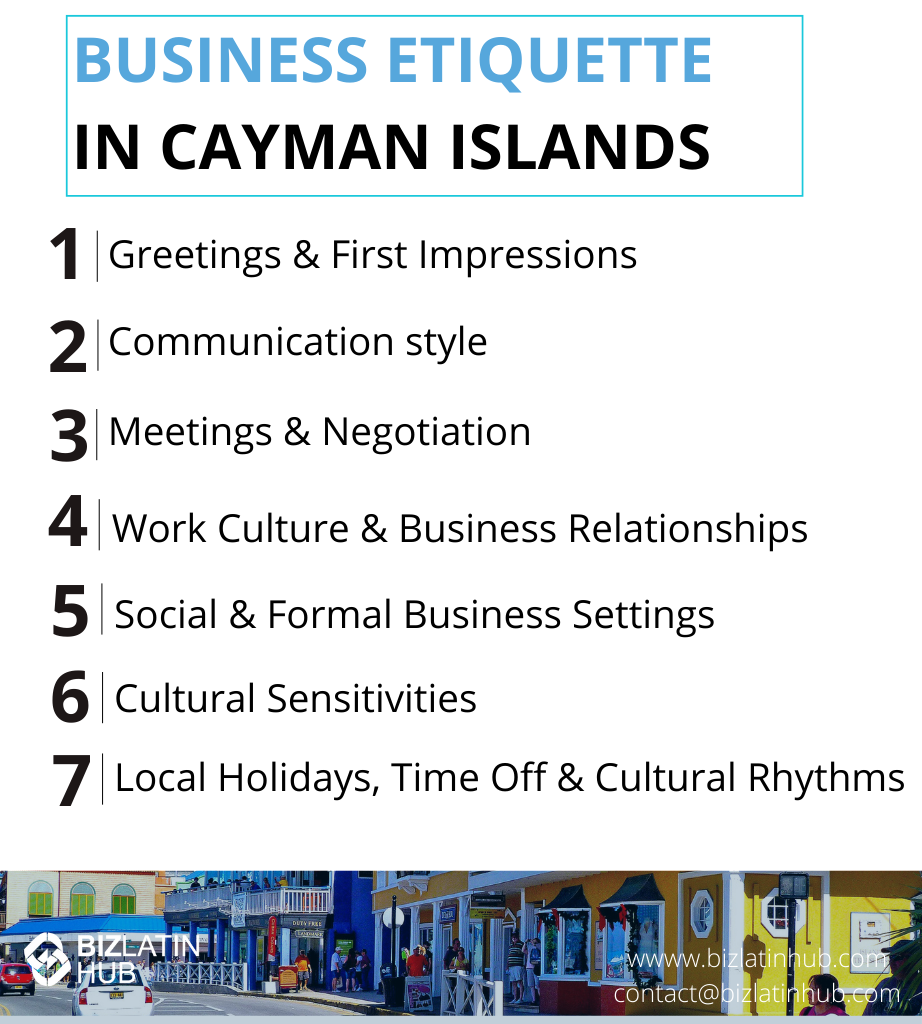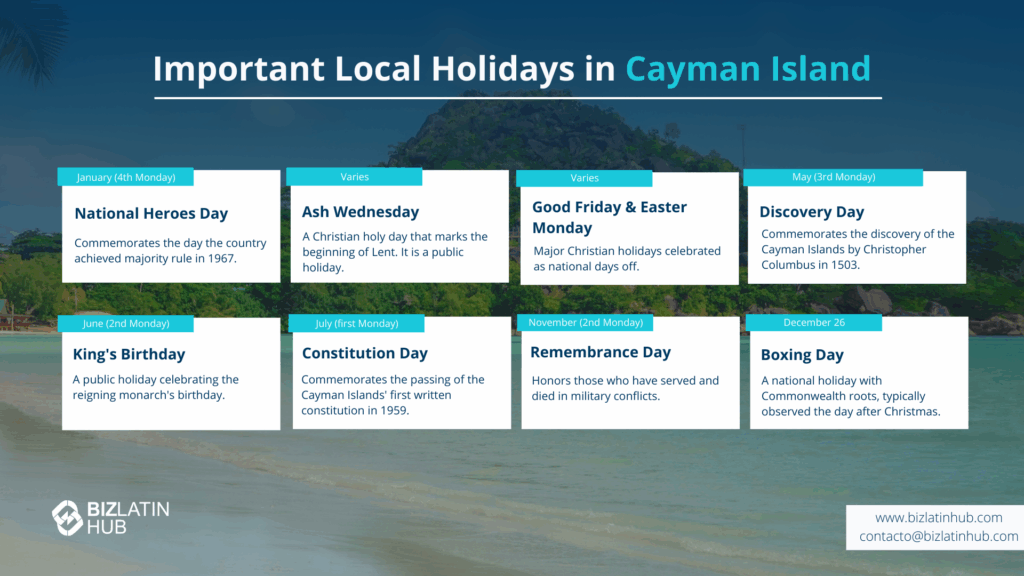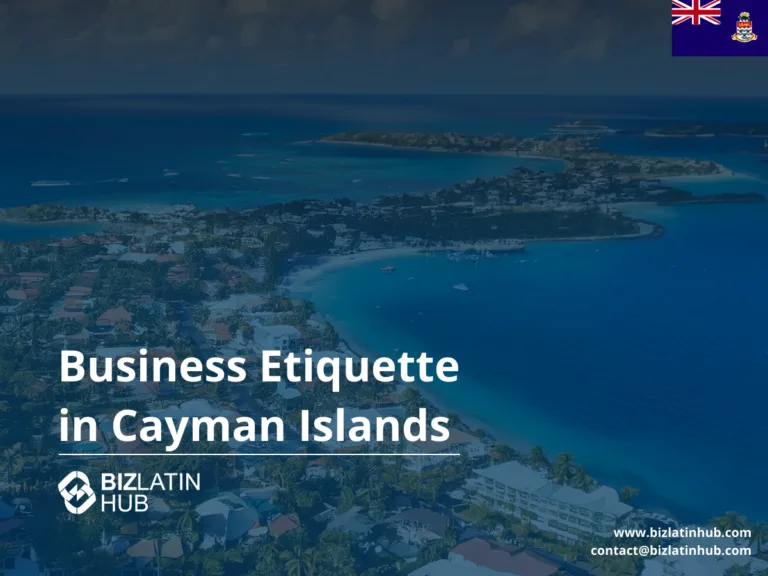Doing business in the Cayman Islands combines the polish of international finance, the expectations of British‑influenced formality, and the relaxed friendliness of a Caribbean island. This is very important for company formation in the Cayman Islands, among other things. Knowing how to present yourself, communicate, and behave in business contexts will help you build trust, respect, and long‑term relationships.
Key takeaways on business etiquette in the Cayman Islands
| How important is it to build relationships in the Cayman Islands? | Just like many Caribbean jurisdictions, the Cayman business culture appreciates relationship building. |
| Is punctuality important in the Cayman Islands? | Being on time for meetings is considered a sign of respect and professionalism. |
| What negotiation style is best? | Communication tends to be courteous, professional, and polite. |
| Stay respectful | Avoid jokes or remarks that might touch on race, colonialism, religion, or local politics (unless you have a strong, appropriate relationship). |
Greetings & First Impressions
- Handshake & Warmth: Business meetings usually begin with a firm handshake, eye contact, and a smile. Formal greetings like “Good morning/afternoon” are standard. Some small talk (family, travel, weather) is common before getting down to business.
- Titles and Names: Use titles (Mr., Ms., Dr., etc.) until invited to use first names—especially in more formal or senior settings. Respect for hierarchy is valued.
- Dress Code & Appearance: Although the climate is tropical, business professionals generally dress smartly. In local firms/business casual settings, men may wear dress shirts and trousers (often without jacket and tie), women wear dresses, skirts or slacks with blouses. For senior meetings, law firms, finance, or formal events, more formal attire like suits, ties, blazers are expected.
Communication Style
- Politeness and Directness: Communication tends to be courteous, professional, and polite. While people can be fairly direct when required, it’s done with diplomacy and respect. Confrontation is typically avoided in public or excessive bluntness.
- Small Talk & Relationship Building: Just like many Caribbean jurisdictions, the Cayman business culture appreciates relationship building. Initial meetings often include informal conversation—to establish trust—before business agendas are tackled. Topics like weather, family, travel are safe.
- Written Correspondence: Emails, reports, proposals are expected to be well‑structured, polite, and professional. Spelling, formatting, and formal salutations matter—especially at first. As relationships become more familiar, tone can relax somewhat.
Meetings & Negotiations
- Punctuality: Being on time for meetings is considered a sign of respect and professionalism. Although there may be some flexibility (“island time” culture), you’ll make a better impression by being prompt.
- Agenda & Structure: Meetings often follow a clear agenda. Senior participants are observed with deference, and decisions often rest with senior management. In international firms, there may be more collaborative decision‑making, but respect for authority remains a base expectation.
- Negotiation Style: Negotiations are usually conducted with politeness and caution. While there is room for firmness, overly aggressive or confrontational styles may be seen as impolite. Building trust first is often more effective than pushing for immediate gains.

Work Culture & Business Relationships
- Hierarchy & Respect: Seniority is acknowledged and respected. When dealing with local partners or public/corporate bodies, recognizing the role and influence of senior figures is important.
- Professionalism: Reliability, discretion, and honesty matter. Especially in finance, legal, investment sectors, confidentiality and adherence to rules (regulatory, ethical) are key.
- Work Pace & Expectations: While the island environment is relaxed socially, business expectations—especially in financial services and international trade—are rigorous. Deadlines are taken seriously, but it’s helpful to allow buffers for delays (travel, logistics, etc.).
- Networking & Events: Social and informal events (cocktails, dinners, receptions) are common business‑networking venues. Attending and being personable can help cement business ties.
- Gift Giving: Not typically a large part of business culture. If gifts are given, they tend to be modest, thoughtful, and not ostentatious. It’s more about the gesture than the value.
- Dining & Hospitality: Be courteous to hosts, accept offers of hospitality graciously. Table manners are expected. Avoid controversial topics at meals (politics, religion).

Things to Avoid & Cultural Sensitivities
- Over‑Casual Behavior: Avoid behaving too casually in formal meetings. Dress appropriately, speak politely, don’t interrupt.
- Assumptions About Pace: Don’t assume everything will move quickly. Some decision‑making takes time. Pressuring too early can backfire.
- Insensitive Comments or Jokes: Avoid jokes or remarks that might touch on race, colonialism, religion, or local politics (unless you have a strong, appropriate relationship).
- Swimwear or Beachwear in Public Areas: Swimwear is for beaches or pools. Wearing it in supermarkets/restaurants/public indoor areas without cover‑ups is frowned upon.
Local Holidays, Time Off & Cultural Rhythms
- Sundays are often quieter; many businesses are closed or operate reduced hours. Religious observances (mostly Christian) are observed. Avoid planning business meetings or travel on Sundays or major Christian holidays.
- “Island time” culture influences social expectations; people tend to be more forgiving of minor delays, especially outside formal contexts. But in business, aim to be on time.
- Work‑life balance is valued; social and family connections matter.

FAQs on business etiquette in the Cayman Islands
These are the most common queries we receive from clients.
Dress smartly. For most business meetings, men often wear dress shirts and trousers, sometimes a tie in more formal firms; women wear dresses, skirts or smart slacks. In finance, law or when meeting senior executives, full business attire may be expected. Light fabrics help due to the tropical climate.
A firm handshake with eye contact is standard. Use formal greetings like “Good morning/afternoon.” Address others using titles until invited to use first names. Including some polite small talk before business helps.
Initially quite formal. Written communications are expected to be clear, polite, and well‑structured. You will establish a tone as the relationship develops, but professionalism is rarely dropped entirely.
Being on time is expected and appreciated. Meetings should begin when scheduled. However, it’s wise to build in some flexibility, especially for external factors like traffic or travel. Communicate early if delays occur.
Extremely important. In Cayman, like many places, business is not purely transactional. Trust, mutual respect, social rapport, and showing that you understand local culture all go a long way toward successful partnerships. In time, it may well even lead to residency.
Biz Latin Hub can help you with business etiquette in the Cayman Islands
At Biz Latin Hub, our multilingual team of company formation specialists has extensive experience in supporting foreign executives when starting a business in Latin America. We offer a complete set of services for your business needs, such as legal, accounting, and recruitment support.
You can rely on us as your main contact for entering and doing business in any of the 18 markets in Latin America and the Caribbean where we operate.
Contact us now for personalized assistance or a free quote on company formation in Latin America.
Learn more about our team and expert authors.





